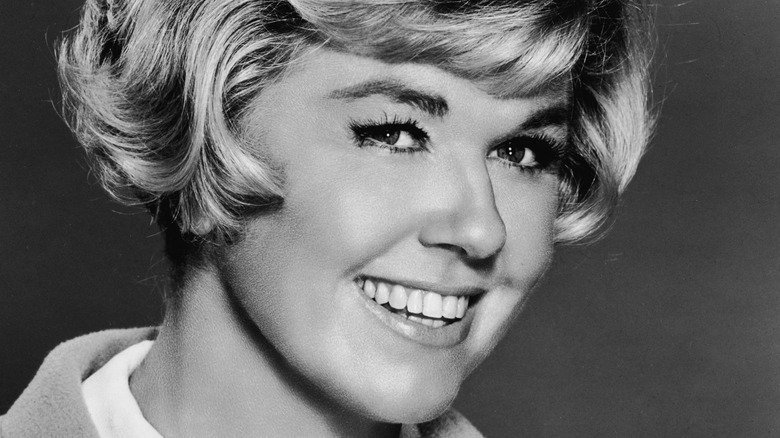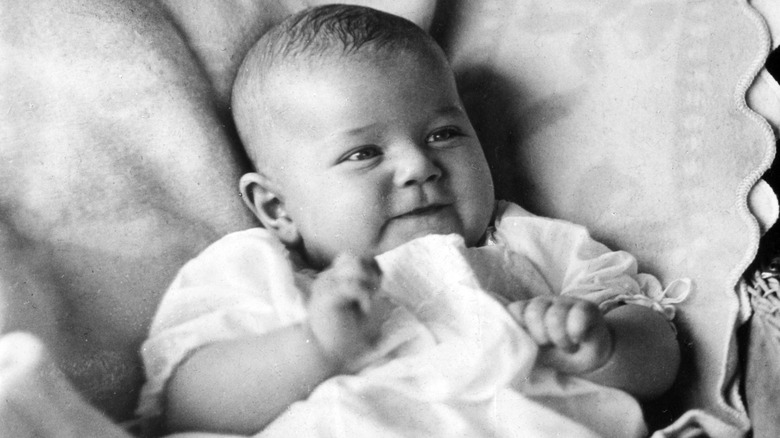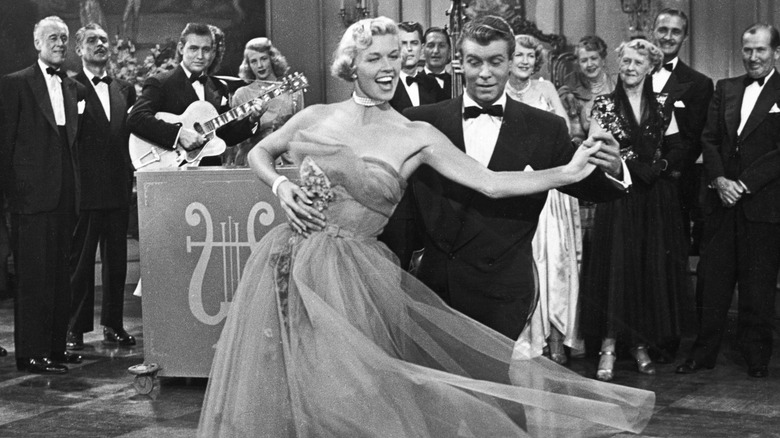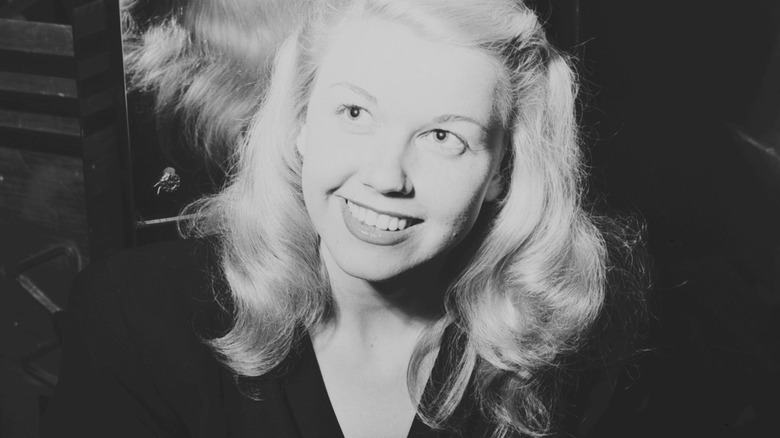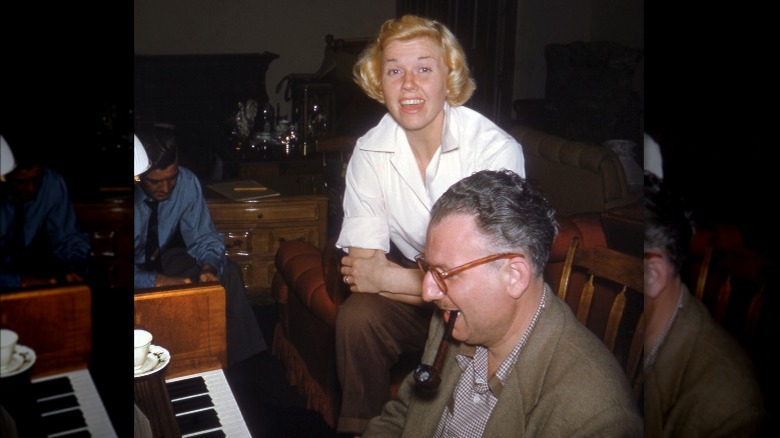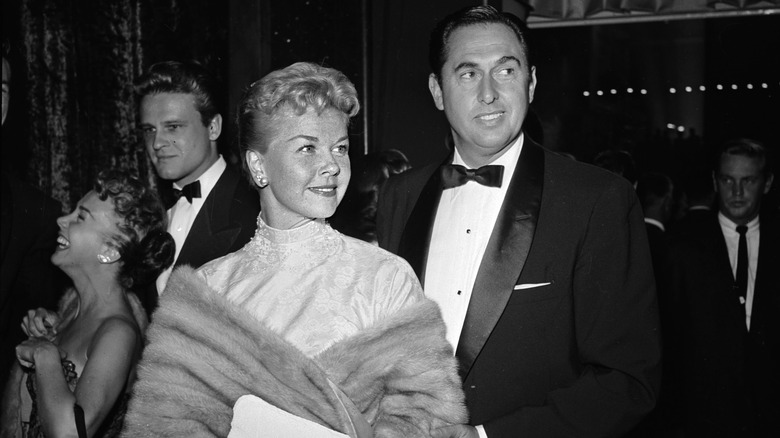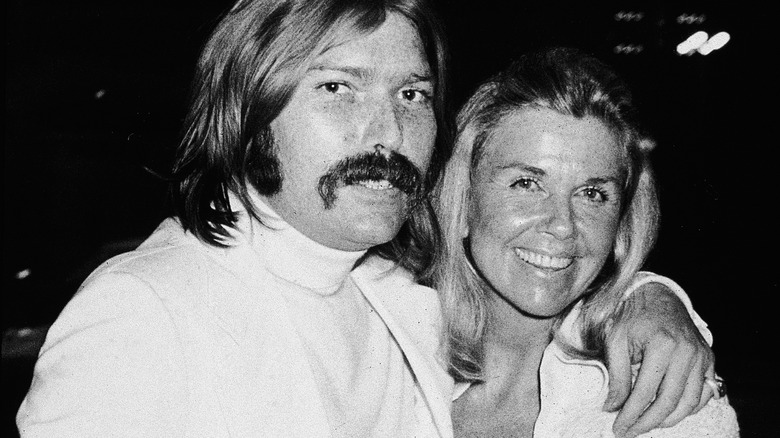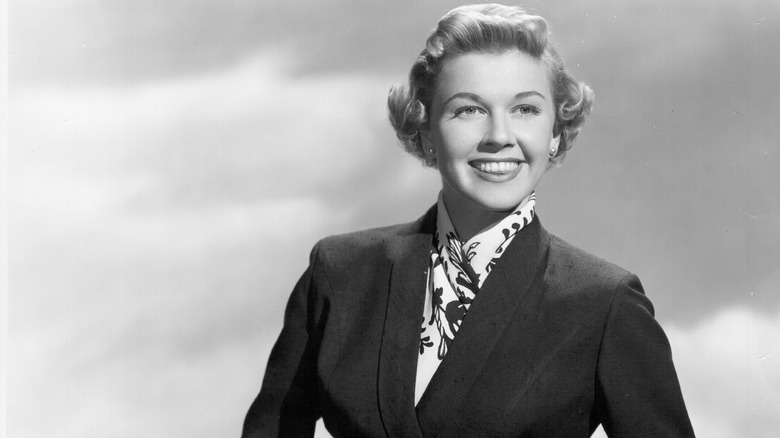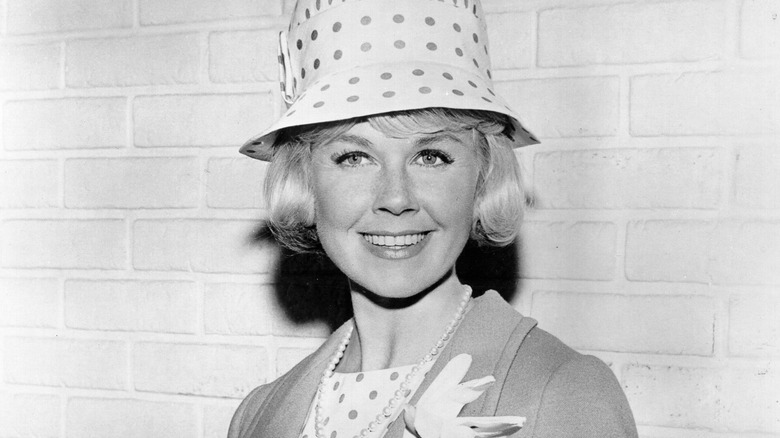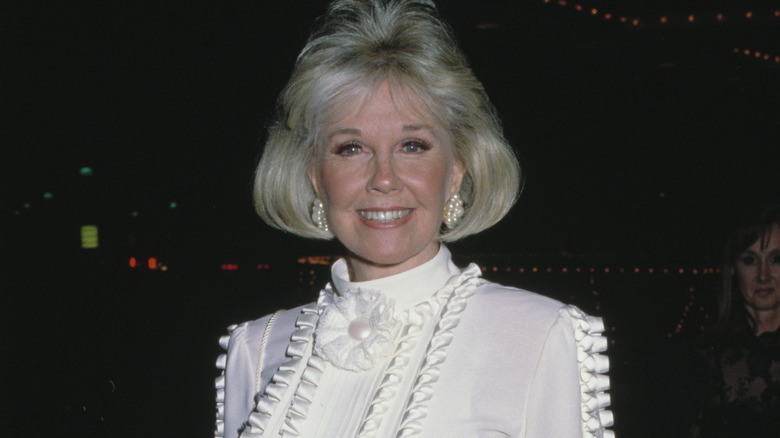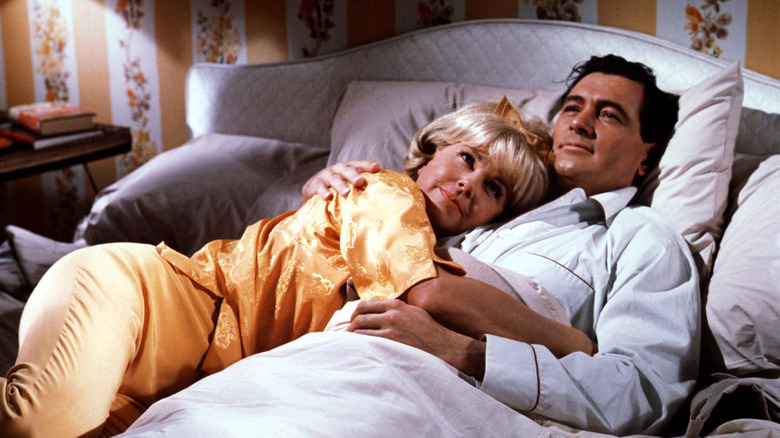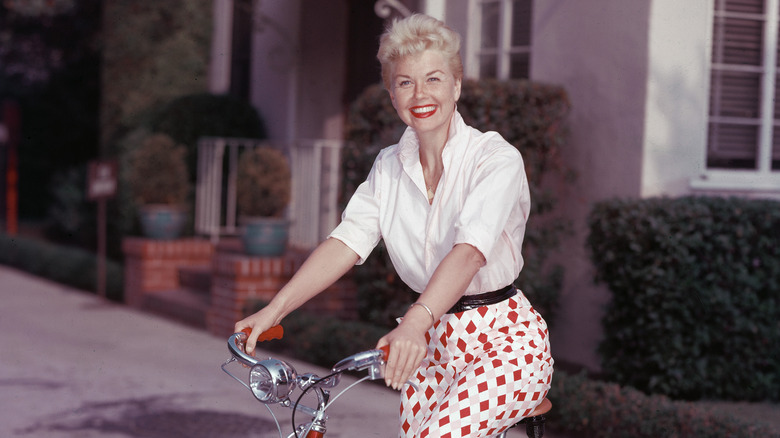Tragic Details About Doris Day
Doris Day had a remarkable Hollywood career, both as a big band singer and silver screen star. Unlike some of her other Golden Age contemporaries, Day's appeal came from her wholesome, bubbly persona, never tarnished by any lewd on-screen roles, such as Marilyn Monroe or Jayne Mansfield. "My public image is unshakably that of America's wholesome virgin, the girl next door, carefree and brimming with happiness," Day recalled in her 1976 autobiography, "Doris Day: Her Own Story."
Sure enough, the blonde's image served her well, and, as noted on her official website, Day's career lasted an incredible two decades, from the mid-1940s until her final film role in 1968. According to The New York Times, the Ohio-born celeb officially retired in 1973 — a time when Tinseltown was already changing, making room for racier pictures. By then, film critic Pauline Kael had already scathingly dubbed her "the all-American middle-aged girl" (via The Washington Post).
What some people may not know, however, is that the public's dismissal of Day at the time of her retirement was the least of her concerns. Behind her cookie-cutter image was a woman who was surely exhausted from decades of misfortunes. As she declared in her book, "I have suffered and I have had good times ... and I have finally come to the time in my life when I have evolved a personal philosophy which I think others may want to know about." Let's look at the tragic details of Doris Day.
Doris Day didn't have a stable home life
For a star with such a cheery disposition as Doris Day, it's interesting to see that the early years of her life weren't exactly easy-going. Doris Mary Anne von Kappelhoff (which she later changed to "Day") was born on April 3, 1922, in Evanston, Ohio, a suburb near Cincinnati. According to TCM, she was the youngest of three children. As Day wrote in her autobiography, "Doris Day: Her Own Story," her parents were the children of German immigrants, with her mother tending to their home while her father, a quiet man, was a music teacher and choral master.
One of Day's older brothers died after she was born, which meant that the young tot grew up with one sibling, and neither of them saw their father much. As Day recalled in her book, however, she believes it may have been for the best, as the little time her dad spent at home would consist of constant squabbles with her mother.
Day's parents finally separated when the future star was 12 (via TCM). According to her autobiography, this was due to her father's affairs — specifically, with one of her mother's best friends. Heartbreakingly enough, Day found out about his philandering well before her mom did, as she spied on her father's adulterous activities one night from her bedroom, where her parents were hosting a massive party. "[I] burrowed my crying face into the [bedsheets], but there was no way to shut out the awful things I was hearing," Day sadly wrote.
Her dreams of being a dancer were shattered at 15
Before Doris Day even entertained the idea of becoming a singer or actor, she had other aspirations. As she explained in her autobiography, "Doris Day: Her Own Story," when she was a little girl, Day regularly begged her mother to enroll her in dance classes, finally succeeding and going to her very first tap dancing class in kindergarten. From there, she ended up trying her hand at ballet and, later, acrobatic dancing.
At one point, Day's third dancing school, Hessler's, even held a contest where the prize was 25 free acrobatic dance lessons. The catch? The contestants had to remain in a handstand, and whoever outlasted the rest won. "For weeks I was never on my feet," the singer recalled in her book, noting that she practiced at home by walking around and climbing the stairs on her hands. Of course, Day won first place.
Per The New York Times, at 15, Day won $500 with her dance partner at yet another competition, and this time, the parents of the two teens packed up their bags, ready to take their growing stars to Los Angeles. According to Day's book, the day before the big move, she hopped in a car with her boyfriend and two other friends to grab some dinner. Heading back home on a rainy night, they didn't notice a train heading in their direction, resulting in a horrible crash. Day's leg was shattered, but even worse, she kissed her dancing dreams goodbye.
She lost her beloved puppy as a teen
After Doris Day's horrible car accident on the eve of her move to Hollywood, she fell into a state of despair. With her dancing dreams crushed, the young girl returned to school on crutches. "I felt that, I, who had always been so active and rather dynamic around school, was now being pitied — and pity is an emotion which I despise," the future star wrote in her book "Doris Day: Her Own Story."
As a distraction, Day's mother enrolled her in singing classes, but if that's not all, she was also gifted a dog: Tiny. Sadly, as the "Pillow Talk" actor recalled in her autobiography, "He was destined to hurt me in a way I would feel for the rest of my life." In the short time Day owned Tiny, she would take him out on leashless walks while she was still using her crutches. One day, her pup suddenly ran out into the street, and Day, unable to chase after him, watched him fatally collide with a car. Feeling an incredible sense of guilt, the singer wrote years later, "My loneliness was intolerable."
According to The New York Times, Day's sense of guilt never truly went away. In her adulthood, even after she retired, she spent her days as an animal rights activist, rescuing stray dogs and finding homes for them; and even started her own foundation, the Doris Day Animal Foundation, which has carried on even after her death in 2019.
Doris Day was incredibly unlucky in love
Doris Day married four times, yet never found her happy ever after. When she was just 16, Day sang at a club in Cincinnati. According to her autobiography, "Doris Day: Her Own Story," that's where she met her first husband, trombonist Al Jorden. Unimpressed with the bubbly blonde, Day soon won him over, and the pair wed three years later, per The New York Times. Sadly, Jorden was physically abusive and incredibly jealous, beginning his first tirade a mere day after they got married and even assaulting her after she revealed her pregnancy and refusal to get an abortion. The following year, they decided to divorce.
According to The New York Times, her subsequent marriage to saxophonist George Weidler was, at least, non-violent, although he decided to leave her after realizing she was on the brink of A-list fame. According to Day's book, Weidler left her via a letter. In 1951, the singer wed her manager, Martin "Marty" Melcher (via Biography). Day stayed with him until his death in 1968, but after she was widowed, Day found out Melcher squandered her earnings, leaving her bankrupt.
Day's fourth and final marriage to Barry Comden lasted from 1976 to 1981. Per Page Six, at the time of their separation, he declared that he was envious of her pampered pooches.
If you or someone you know is dealing with domestic abuse, you can call the National Domestic Violence Hotline at 1−800−799−7233. You can also find more information, resources, and support at their website.
Doris Day's third husband left her with an incredible amount of debt
Doris Day's marriage to her third husband, Martin "Marty" Melcher, didn't exactly start on the straight and narrow. According to TCM, Melcher became the growing star's manager in the late 1940s, and although he was married to singer Patty Andrews, the pair commenced an affair. By 1951, they were husband and wife (via The New York Times).
As Day wrote in her book "Doris Day: Her Own Story," she lived with Melcher for 17 years in what was apparent bliss. After he died in 1968, however, the actor realized that things weren't as they seemed. "This man who had slept with me, adopted my son, managed my career and business life, was indeed an enigma," Day recalled, declaring her deceased beau as "devious." In what was an absolute shock for the blonde, she had discovered that Melcher and his lawyer, Jerome Rosenthal, had squandered away $20 million — leaving Day $500,000 in debt (via The New York Times).
According to a Forbes article from 1974, Rosenthal used Day's money for various shady "investments" without keeping a popper record of anything. The A-lister subsequently sued him, and sheriff's deputies even had to use forceful means to snag whatever files Rosenthal owned. As The New York Times writes, while Day battled Rosenthal in court, she also took a leading role in the CBS sitcom "The Doris Day Show" to pay off her debts, and by 1974, she had finally won her court case for over $22 million.
Her son was connected to the Manson Family murders
Doris Day's son, Terry Melcher, had a surprising connection to Charles Manson, and it's actually only thanks to his mother that he avoided a death as gruesome as "Valley of the Dolls" star Sharon Tate. According to "Good Vibrations," Dennis Wilson of the Beach Boys initially met the fame-hungry Manson in 1968 and began taking him to industry events where he met Melcher, a record producer.
At one point, the incredibly generous Wilson decided that he wanted to distance himself from Manson, so the man began targeting Melcher for a recording contract. Per "Good Vibrations," Melcher even let Manson audition for him, yet he was ultimately unimpressed, kicking the criminal to the curb. Unfortunately for Melcher, Manson once saw where the producer lived, at 10050 Cielo Drive, in Los Angeles.
According to Day's autobiography, "Doris Day: Her Own Story," 1968 was also the year her third husband, Marty Melcher, died. Terry, who Marty adopted, was incredibly affected after his passing — both emotionally and financially, as his father's shady business deals with his lawyer also left Terry broke. Day, who had moved out of her shared home with Marty since it brought back heartbreaking memories, asked her son to move into the beach house as a means to look after it from preying vandals in the area. Just like that, Terry moved out of 10050 Cielo Drive in 1969, making way for Tate, who took up residence alongside her husband, Roman Polanski, and subsequently became the accidental target of the Manson murders (via Britannica).
A possible reconciliation with her father went wrong
Doris Day came from a broken home, as her father walk out on their family when she was 12, per TCM. In her autobiography, "Doris Day: Her Own Story," she wrote her early memories of her father were that of a "staid German bigot." Nevertheless, even after her father left, she could never resent him.
After years apart, the actor ran into her father in 1956. According to her book, she saw him at the train station in Cincinnati, Ohio, where he invited her to visit his bar, which Day was shocked to find out was in a predominantly Black neighborhood. When she went to the bar, she met Luvenia, a Black woman and her father's fiancee. "I felt totally enveloped by ... the beautiful change that had come over my father," wrote Day.
She didn't see her dad again until a few years later, when her mother and Marty Melcher went to her aunt's home — in an incredibly racist neighborhood. Day invited her father, yet when he showed up, he left Luvenia in the car. Nobody — including Day — asked her to come inside, and after a short and awkward period, Day's father left, with his daughter merely waving at Luvenia in the car. The singer never saw him again.
If you or a loved one has experienced a hate crime, contact the VictimConnect Hotline by phone at 1-855-4-VICTIM or by chat for more information or assistance in locating services to help. If you or a loved one are in immediate danger, call 911.
Doris Day was allegedly a recluse in her final years
After decades in the spotlight both as an actor and singer, Doris Day finally decided to retire from the screen in 1975. According to Biography, the A-lister instead put most of her efforts towards animal non-profit organizations, even making a brief return to the small screen in 1985 for "Doris Day's Best Friends," a show that focused on animal advocacy.
The next few decades were quiet for Day, and although she released an album in 2011, she mostly lived a tranquil life. In 2013, Inside Edition spoke to Sydney Wood, the star's handyman for 30 years, who claimed the star had become a recluse and spent all her fortune on her countless pets. According to Wood, Day allegedly became more closed off after the death of her son, Terry Melcher, in 2004. The handyman explained how close they were, "It was not [a] mother and son relationship. It was deeper than that. Much, much deeper."
Curiously, after Day's death in 2019, the star's friend, Lea Price, spoke out to Fox News, declaring that the rumors were false and her pal simply enjoyed her peaceful life. "She loved her home," shared Price. "She loved her pets. She loved answering all her fan mail ... she was actively involved until she passed away."
Her grandson claims he was prevented from seeing her
During Doris Day's final years, questions began to arise about whether or not those closest to her had hidden agendas. As her former handyman, Sydney Wood, told The Daily Mail in 2013, "She used to have the right people taking care of her. People like me, who worked for her out of love not for the money." What's more, Day's neighbors also claimed they rarely saw the actor anymore.
Perhaps Wood's assertion that Day surrounded herself with dubious characters had some truth to it. After her death in 2019, Day's only grandson, Ryan Melcher, claimed he was unable to visit his elderly grandmother. As Melcher wrote in a Facebook post, this actually lasted for years, citing an invite from Day to see her in 2004 after her son Terry Melcher's death. Instead, Ryan was asked by his grandmother's business manager to meet with him first, where he demanded to know why Ryan was making plans to see the star. "I'm afraid you aren't going to be able to see your grandmother," the man declared, using the divorce of Ryan's parents as an excuse.
Interestingly enough, Day's publicist at the time, Charley Cullen Walters, painted a different picture, sharing that it was his client's decision not to see her grandson (via Page Six). To further corroborate this story, Day's manager later revealed that her fortune went towards her non-profit organization, the Doris Day Animal Foundation.
The death of her good friend Rock Hudson shattered her
During her heyday as a silver screen star, Doris Day developed a close friendship with her co-star, Rock Hudson (via People). Together, Day and Hudson appeared in 1959's "Pillow Talk," followed by "Lover Come Back" and "Send Me No Flowers," all of which solidified their status as the "It" duo to watch in Hollywood. "I think the reason people liked our movies is because they could tell how much we liked each other. It came across that way on screen," Day recalled to People in 2015, adding, "He was a good friend."
Well into her retirement years later, Day became a TV host for her 1985 variety show, "Doris Day's Best Friends," inviting her old pal to come on as the very-first guest in July. According to People, this was around the same time the "Come September" star made his AIDS diagnosis public. Nevertheless, Hudson kept his promise to Day and appeared on the show, with the singer later recalling to People how exhausted he was from his health condition on set. "He was very sick. But I just brushed that off and I came out and put my arms around him," Day remembered.
Sadly, their tearful goodbye after the taping of Day's show was the last time she would see her good friend. Hudson died only a few months later, in October, due to complications of AIDS.
Doris Day's on-screen roles stereotyped her
Doris Day saw great success as a movie star, even landing an Academy Award nomination for her work in 1959's "Pillow Talk" alongside Rock Hudson. As an essay published in the University of Texas Press' Cinema Journal acknowledged, Day came from a musical comedy background at the start of her career, yet it's the romantic comedies from the late 1950s until the mid-1960s that really saw her popularity soar.
Yet, even with her success, the actor always felt she was pigeonholed for her stereotypical girl-next-door image — and even unintentionally played into that idea, too. As detailed in "Easy Riders, Raging Bulls," director Mike Nichols offered Day the legendary role of Mrs. Robinson in the seminal coming-of-age movie "The Graduate," only giving it to Anne Bancroft after the blonde shot it down, saying, "It offended my sense of values." A decade after "The Graduate" was released, Day published her 1976 autobiography, "Doris Day: Her Own Story." When asked why she wanted to release a book, the actor declared, "Because I'm tired of being thought of as Miss Goody Two-Shoes ... It has nothing to do with the life I've had."
Sadly, Day was never really able to shake off her image. In 1999, The American Film Institute snubbed the star on their list of the top 50 "Greatest Screen Legends," leading film critic David Thomson to bemoan to The Independent, "I grieve for Doris Day and the ignorance that regards her as old-fashioned."
